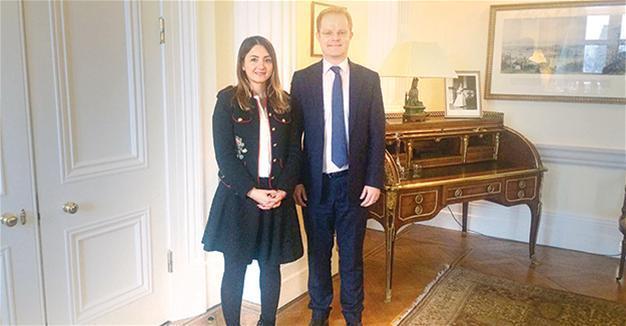The fall of Aleppo is not the end of the war in Syria: UK Special Representative for Syria
İpek Yezdani - ISTANBUL ipek.yezdani@hurriyet.com.tr

The fall of Aleppo will not mean the end of the war in Syria and the fundamental aspect of this war has not changed, U.K. Special Representative for Syria, Gareth Bayley, has told a group of Turkish journalists in Istanbul.
“It is a human catastrophe, an absolute tragedy. Across the country there are nearly 600,000 people in besieged areas that need the international community’s help. It looks ahead like we will be seeing yet more instability, yet more human catastrophe,” Bayley said.
Following the reestablishment of control by the Russia-backed Bashar al-Assad regime over eastern Aleppo, captured four years ago by armed opposition groups, Bayley briefed journalists in Turkey on the latest situation in Syria.
He said it was clear there are crimes against humanity being carried out in east Aleppo. “There are very credible reports of disappearances, arbitrary detention and torture. Anyone who commits crimes must be brought to account. There must be accountability in this war, as there has been in other wars,” Bayley added, stating that nobody knows how far the regime will advance after Aleppo.
“One choice is for it to go to Idlib city, the other is to retake Palmyra, a third option is to head east to Deir ez-Zor or Raqqa. It depends how much Russia and Iran decide they are prepared to support the regime. How much cost are Iran and Russia prepared to bear to complete this idea of a full Syria? Iran may think it has already achieved its objectives, having got its corridor to the Mediterranean Sea. The Russians have their bases. Those military objectives have been achieved,” he said.
Bayley described Turkey’s receiving of 3 million refugees as an “extraordinary contribution” to the humanitarian agenda, but warned that al-Assad might push for more refugees to come to Turkey.
“Al-Assad will try to push more [people] into Hatay if he can. Idlib is already full of people, where will they go? If he can push them out further to Kilis, he would do that,” he said.
Positions of Iran and Russia
Bayley said the al-Assad regime is completely dependent on foreign support, including “irregular militia support.”
“The obvious problems here are the positions of Iran and Russia. We urge Iran and Russia to rethink their policy and to recognize they face enduring costs to their sponsorship of the al-Assad regime. It is not going to be an easy future for either of these countries, and the cost in supporting a regime like this is incredibly high. We won’t get stability this way,” he added, while stressing that he does not foresee an imminent return to political talks or an end to the war in Syria in the near future.
“Firstly, the al-Assad regime, through its negotiator [Bashar] Jaafari, has never shown any willingness to actually negotiate. Secondly, the opposition knows that if they go back to Geneva talks, recent history shows us that violence increases as the al-Assad regime tries to strengthen its hand at the table. Before they go to negotiations, violence increases,” Bayley said.
The U.K.’s priority in the Syrian crisis right now is aid and assistance, he added.
“The U.K. is the second largest donor country in this crisis. We have committed over 2.3 billion pounds [around 10.5 billion Turkish Liras] to this crisis and we are working with our partners to meet the humanitarian requirements of people who are displaced in Aleppo, which has been totally destroyed. You need $200 billion to reconstruct Syria,” Bayley said.
The role of Syrian Kurds
Regarding the role of the Syrian Kurds, Bayley said the U.K.’s consistent message has been that “the Kurds need to play a role in a Syrian process, not just in a regional process.”
“When we have spoken to the PYD for example, we have said things like the unilateral announcement of the Rojava administration, outside the Geneva negotiations, are not acceptable and we don’t recognize them,” he added.
 The fall of Aleppo will not mean the end of the war in Syria and the fundamental aspect of this war has not changed, U.K. Special Representative for Syria, Gareth Bayley, has told a group of Turkish journalists in Istanbul.
The fall of Aleppo will not mean the end of the war in Syria and the fundamental aspect of this war has not changed, U.K. Special Representative for Syria, Gareth Bayley, has told a group of Turkish journalists in Istanbul.